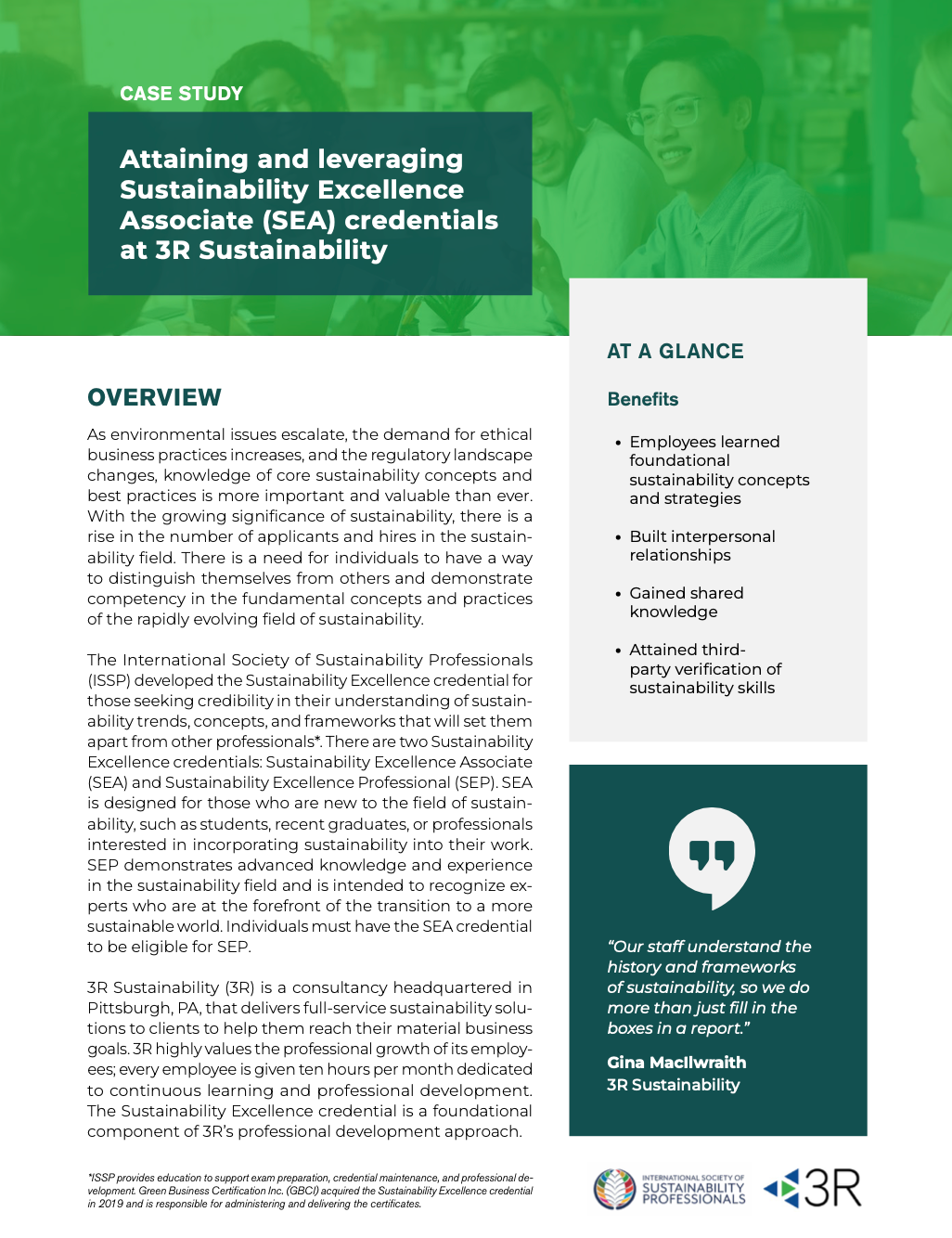SEA Case Study: Interview with 3R Sustainability
The next SEA Study Cohort starts soon! Sign up to receive 12 one-hour study sessions and stay on track with your exam preparation.
Recently, we interviewed Gina MacIlwraith, MBA, SEP about the importance of continuous sustainability education and the value of the Sustainability Excellence credentials in the competitive consulting industry.
Gina is the Associate Director of Sustainability Assurance at
3R Sustainability, which is a women-owned business providing consulting services rooted in science, supported by data, and driven by innovation, education, and continual improvement. 3R delivers full-service sustainability solutions to their clients to achieve material business goals. Previously, Gina served as the General Manager of ISSP for almost four years, and she earned both her
SEA and SEP credentials. Now she promotes
study cohorts among her team at 3R, which has resulted in over 30 colleagues completing the SEA exam and over 75 colleagues completing the cohort training.
You can learn more about this work by downloading the free 2024 case study on
Attaining and Leveraging SEA Credentials.
Why does 3R require the Sustainability Excellence credentials for your team?
The reason we require the credentials is because it’s the best way to ensure our team members all have a consistent foundational understanding of ESG principles. Also, in consulting specifically, it is key to have a credential for third-party verification. You can earn other specific credentials, but this is the only one that demonstrates the foundations of a sustainability professional. So it gives us a step up as a consulting company to say that our entire team has a common understanding of the globally accepted fundamentals of sustainability. This is important right now, in particular as sustainability is both growing and becoming more and more controversial at times. Our staff understands the history and frameworks of sustainability – the why and where it came from, so we do more than just fill in the boxes in a report.
Tell us more about the process for getting your team and interns credentialed. What does this look like for your team as far as resources and time?
We’ve now done our study cohort six times. After last spring’s cohort with full-time employees, one team member commented that along with learning the fundamentals of our profession, employees were really able to bond and create interpersonal connections when studying together. It gives us a common language.
For example, we bonded over John Elkington, and we were joking about getting John Elkington tattoos. Then, it seemed everybody had a John Elkington question on their [SEA] exam. We've got this group of employees who are hybrid or remote, and so we do sometimes have a hard time finding commonalities, but these cohorts give us something that's very work-related, but also very employee-engaging.
And the truth is, when we do these cohorts, we very rarely study for it. The time is focused on interesting discussions about sustainability, what's going on in the world currently, and how this knowledge applies. So really, the SEA handbook is more than a study guide. It gives you an incredible framework for having conversations around sustainability.
How do you fit the investment in credentialing into your overall business strategy?
Every employee at 3R gets 10 hours each month of continuing education professional development. This is at the core of our business because sustainability is changing so fast. We all need our 10 hours to keep up with everything.
It’s also a commitment that Jana and I have made because it helps us better advise our clients. It just makes us better. Honestly, my tagline or my joking value proposition on business development calls is that I read the newsletters so you don’t have to. I sit through all those webinars, so you don’t have to. That’s how we help our clients, and the SEA is another piece of that.
Do you have a specific example or a story that demonstrates how a staff member utilized the knowledge from their SEA or SEP to improve a client project?
When it comes to the SEP credential, we do it every day. That's our process. There's just two of us that have enough experience to qualify for the SEP, but the truth is that the SEP process is what we do with every one of our clients. We do materiality, we do stakeholder engagement, we create sustainability plans, and we do change management.
For those starting out in the sustainability field, do you have any advice for them?
Sustainability is an umbrella term; it’s rich in history. Understanding the full scope that can be included in the term is critical to success. The SEA credential gives practitioners the context to know how the field has evolved, along with the topics and issues that our profession can be tasked with as evidence of change.
Read perspectives from the ISSP blog


Where to find us
International Society of Sustainability Professionals
1204 Village Market Place, Suite #112
Morrisville, NC 27560
USA
Have a question? Check our FAQs.
Looking to advertise?
View
opportunities.
Menu
Get our newsletter
Join the Newsletter
Thank you for subscribing to the ISSP newsletter! We're grateful to have you in our network to help us push forward sustainability change.
Oops, there was an error sending your message. Please try again later!
You can also email marketing@sustainabilityprofessionals.org for help.
Terms of use Privacy policy GDPR Accessibility Membership policy © ISSP 2025. All Rights Reserved.
The International Society of Sustainability Professionals (ISSP) is a 501(c)3 nonprofit organization. EIN 26-3662721.


